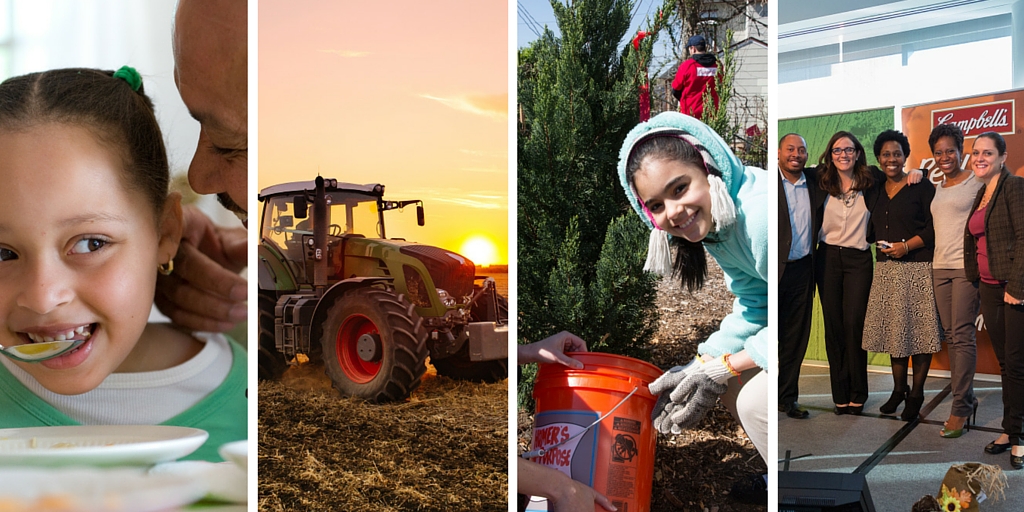By: Dave Stangis, Campbell’s Vice President, Corporate Responsibility and Sustainability
Corporate citizenship humanizes, improves and personalizes a company’s purpose in the world it serves. At Campbell, it’s how we work every day—from the water and energy we use, to how we make our food, to how we support our employees and help our neighbors. It’s integrated into our business strategy.
Sustainability and responsibility are not only good for the resources we all share and the communities where we live and work—they’re good for business. Reducing water and energy use, increasing recycling and reducing the amount of material in our packaging are some of the ways sustainability supports our goals.
Citizenship is also about transparency. Campbell’s sustainability work follows our north star—our Purpose, Real Food that Matters for Life’s Moments. It’s a filter for our decision-making and has changed the way we think, talk and act about our food.
Our CEO Denise Morrison said it best: “We can make a profit and make a difference, and we are doing both through our business and by living our Purpose in a way that’s authentic, that’s transparent and that truly matters.”
MAKING A SUSTAINABLE DIFFERENCE BY 2020
Although we still have work to do, we are making significant progress toward our four key 2020 sustainability goals:
- Cut our product portfolio’s water consumption and greenhouse gas emissions in half.
- Measurably improve the health of young people in our hometown communities.
- Continue to provide consumers with nutrition and wellness choices in our product portfolio.
- Use CSR and sustainability as key drivers of employee engagement and performance.
WHAT WE’RE DOING AND HOW IT’S WORKING
We’re reducing our environmental footprint, connecting with consumers in more meaningful and transparent ways and providing the residents of our communities with more healthful food options.
REDUCING OUR ENVIRONMENTAL FOOTPRINT
- Expanded renewable energy in our manufacturing facilities through the addition of a co-generation combined heat and power unit in Toronto, Canada, and a second fuel cell and new 1 MW solar array in Bloomfield, Connecticut.
- Increased our waste recycling rate to 84 percent, making progress toward our 2020 goal of 95 percent.
- Reduced agricultural water use by 18 percent (gal/lb. raw tomato) and produced 12 percent fewer fertilizer-related GHG emissions (per ton of tomatoes) since 2014.
MEASURABLY IMPROVING THE HEALTH OF YOUNG PEOPLE
- Continued to combat childhood obesity and hunger through Campbell’s Healthy Communities, a $10 million, 10-year initiative that promotes nutrition, physical fitness and access to more healthful foods for children in Camden. Now in its fourth year, the program has created healthy food access at more than 40 corner stores in a city classified as a “food desert.”
- Donated more than $50 million in food to support organizations such as Feeding America in the U.S., and provided more than 2 million pounds of food to Food Banks Canada to support food-insecure Canadian families.

TALKING TO CONSUMERS ABOUT HOW OUR FOODS ARE MADE
- Introduced whatsinmyfood.com, a consumer website that shares what goes into our food, how we make it and why we make the choices behind the ingredients we use.
- Were the first major food company to support a mandatory national labeling standard for products that may contain GMOs.
- Committed to eliminate the use of artificial flavors and colors, added preservatives, MSG and high-fructose corn syrup in new products in our North American portfolio by 2018.
DRIVING EMPLOYEE ENGAGEMENT
- Received a perfect (100) score for the seventh year on the Human Rights Campaign Foundation’s annual Corporate Equality Index, and designated as a Best Place to Work for LGBT Equality.
- Delivered more than 14,000 employee volunteer hours in the U.S., and awarded $169,500 Dollars for Doers grants to nonprofits based on those volunteer hours.
I invite you to check out our latest Corporate Responsibility (CSR) Report to see the positive impact we’re having every day on everything from our water and energy use, to our communities, to the land where we farm our real food, to the products we make for all of life’s moments.






